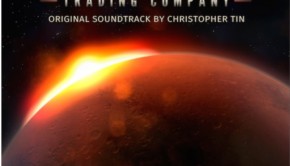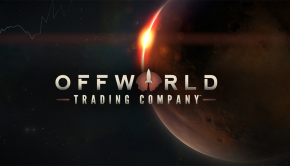Christopher Tin Interview: Calling All Dawns
Christopher Tin’s debut album Calling All Dawns — a tie-in with Civilization IV — won the first Grammy awards for game music last year. This month, he released his sophomore album God of Love, a collaboration with Shoji Kameda (aka Kametron). While this album shares a focus on vocal performances, it incorporates contemporary rather than orchestral stylings.
In this interview, Tin discusses what inspired him to create a radically different second album. He also reflects on winning a Grammy, discusses Calling All Dawns: Surround Edition, and his work on several animated videos. Tin also reveals that he is currently working on several video game projects.
Interview Credits
Interview Subject: Christopher Tin
Interviewer: Chris Greening
Editor: Chris Greening
Coordination: Don Kotowski
Interview Content
Chris: Christopher Tin, it is a great honour to talk to you today. At least on initial inspection, your second album God of Love couldn’t be more of a contrast with your debut: dark, percussive, and contemporary. What inspired this audacious shift in sound? What do the contrasts between God of Loveand Calling All Dawns reveal about you as a musician?
Christopher Tin: Well, I suppose you could say that it reveals that I have a broad range of taste in music! But that shouldn’t be a surprise, really, because many people listen to many different genres of music. So if a musician is able to create in multiple genres, why shouldn’t they, right? I wanted to try something different, and I’d been toying with the idea of doing some electronic work for awhile now. This was a good opportunity to flex some muscles, both in terms of a different genre, and also working with a collaborator. (I’m used to being the boss musically, so it was an interesting exercise for me sharing the composing process.)
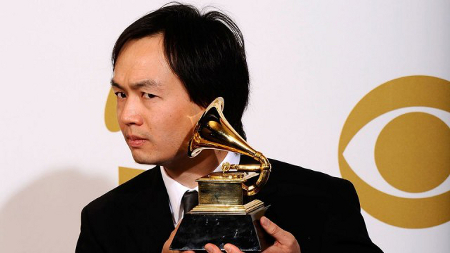
Chris: One aspect God of Love and Calling All Dawns share is a focus on vocals. What inspired you to adapt renaissance and romantic era poems into lyrical pieces here? How do they capture the focus of this concept album, love and death?
Christopher Tin: Well, I’ve always been a fan of vocals and using texts. That was my main thing inCalling All Dawns, after all, and it goes back to my love of musical theatre. Using Renaissance and Romantic texts happened by accident — Kametron and I were on a deadline to write a song for a Lindsay Lohan video, and we didn’t have enough time to write lyrics, so I said, why don’t we just borrow some from this old Thomas Carew poem that I know? That song became “A Rapture”, and that established the template for the rest of the album.
Chris: You describe God of Love as a blend of trip-hop, post-punk, and synthpop. Given your classical background, how did such styles become so important to your eclectic musicality? Could you elaborate on your artistic influences in this release?
Christopher Tin: I suppose you could hear anything from Nine Inch Nails, Massive Attack, and dubstep to Postal Service and 80s revival in the tracks. I can’t say that when we put this together we consciously decided to pull from any of these bands. Stuff just sort of happens. You throw things out there, and sometimes you unconsciously channel a song that you may have heard in one way or another. That’s just part of the composing process.
Chris: God of Love is actually the product of your collaboration with a fellow Asian-American, Shoji Kameda. After he performed taiko on Calling All Dawns, what led you to form an equal collaboration together on this release? How did your musical approaches and philosophies complement when creatingGod of Love?
Christopher Tin: We’d been talking about partnering up on something for awhile. What’s great is we both bring very different tools to the table. If there’s a melody that gets stuck in your head, chances are it’s mine. If there’s a beat that makes you get up and dance, chances are it’s his. There’s not a ton of overlap between what we do, so it was a pretty easy collaboration. Kametron and I go way back, actually. We played taiko together at Stanford University, and even back then he was playing on recordings that I was producing. It was just one of those things where we thought it would be a fun way for us to step out of our daytime personas for awhile — myself as a classically trained composer for media, himself as a world music percussionist.
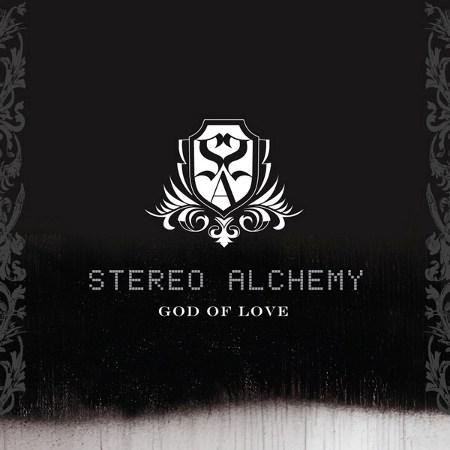
Chris: Once again, you scouted a range of vocalists from different backgrounds on this album. How do you find talent to feature in your releases? What did you look for from performers on this album, in contrast to Calling All Dawns?
Christopher Tin: We wanted to keep the roster of singers to three at the most, and so unfortunately while there were some singers from Calling All Dawns that I would have liked to bring on board this one, we needed to keep the roster tight. Melissa R. Kaplan came to me from a referral from my mentor Graeme Revell. Lia Rose is a gal I met through the Recording Academy. When I first heard her demo, I was just mesmerized by her voice. Mozez is a singer I knew of from his work with Zero 7. “To Eternity” was actually written with him in mind.
We knew we wanted a bit of a contrast between our singers — for example, our female singers Melissa and Lia, both excellent in their own way, are both very different in their approach to imbuing meaning in words. And sometimes one of them worked better for a song than the other — and that’s not a slight at all, it’s that sometimes the words of a song just seem to resonate so well with a particular singer’s tone. There was a certain amount of swapping of songs, up until the very end, while we tried to find the right combination of song and singer.
Chris: Creating an electronic album also requires special attention to technology. How did you approach the release from a technical perspective and what setup did you use? Did working with acclaimed engineers Darrell Thorp and Tom Baker help to give the release a cutting-edge sound?
Christopher Tin: Totally. And Kametron’s quite the producer too. We mainly used Apple’s Logic for writing, with a lot of third-party plugins. Pro Tools was used for mixing. All the drums, vocals, and guitars were recorded live. The keyboards were played in… the synths programmed. There was a lot of tweaking of sounds, up until the last minute. And then, we brought in the big guns with Darrell and Tom.
Chris: It’s fair to say that you’ve been less active in the scoring field lately. Did the success of Calling All Dawns inspire you to shift your focus from score to album productions? Or are you still working on film and game scores too?
Christopher Tin: I’ve been a little less active in the film world in the last year, true. After a stint working on the Weinstein Company film Hoodwinked Too! and an indie documentary called The Lost Bird Project, I set aside the film work to try to wrap up God of Love. I’ve been juggling a few games, though, so those are on the horizon. I haven’t been able to talk about them, because of the secrecy of the industry, but look for some announcements soon.
But to get back to your point, yes, my career has sort of added a new dimension to it: record producer. I signed with Warner/Chappell publishing too, so that’s been opening up some interesting doors for me as well. I’d say about about 30% of what I do these days is films, 30% is games, 30% is albums, and the other 10% is a mishmash of commercials, concert commissions, and other stuff. I feel fortunate, though, that I have my foot in a number of different industries. It keeps me on my toes, and keeps things fresh.
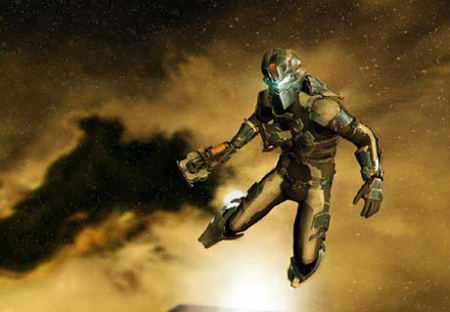
Chris: You also scored the animated video tie-ins for Dante’s Inferno and Dead Space. What inspired you about these projects? Were you influenced at all by Garry Schyman and Jason Graves’ approaches to the game scores?
Christopher Tin: I was brought on board both films by the director Mike Disa. We go way back… we’ve done about four films together now, I believe, and he was there in the audience when I won my Grammys. And as far as being inspired by the original game scores, actually, I was directed to make music that sounded like the original scores! EA wanted both projects to sound similar to the game franchises. Garry and Jason both did great jobs with the originals. I tried to honor that as much as possible.
Chris: Your latest album release isn’t the first time you took a risk. Back when you released Calling All Dawns, many were worried that the album wouldn’t be a commercial success. After all, you were a breaking artist who hired numerous vocalists, top engineers, and one of the most acclaimed orchestras in the world. Looking back, did you feel it was a gamble? Or did you have confidence the release would pay off?
Christopher Tin: It was absolutely a gamble! And looking back on it, knowing what I know now, I might not have taken it. But I’m fond of saying that Calling All Dawns was the type of album that only a person who had never done an album before would try to make. And by that, I mean that it was so grand, so complex, so epic in scope, so ambitious, that only an absolute fool, madman, or rookie would try it. But the thing is, I always had confidence that it would pay off. I knew I had a pretty good thing going, and I knew that there was a lot of pent-up curiosity from my fan base about what an album based around “Baba Yetu” would sound like. And so I knew that it would eventually pay off.
Chris: Of course, the biggest way that Calling All Dawns paid off was with a double win at 2010’s Grammy Awards that you mentioned earlier. How did it feel to win these awards — do you consider it your biggest achievement to date? Looking back, did you expect a guest contribution on a video game,Civilization IV, would eventually yield you a Grammy?
Christopher Tin: Absolutely, yes, the Grammys have been the biggest milestone in my career thus far. It feels pretty good… it’s a nice shot of confidence. It doesn’t radically revamp your career in any way, nor does it change who you are. You still have to bring it with every job, and every new album you release. But it does make it easier to get my phone calls returned when I introduce myself as ‘Christopher Tin, two-time Grammy winner.’ And I’m the kind of guy who likes to get stuff done, so any tool that can help me accomplish what I need to accomplish, I wield with aplomb. And that’s sort of what the Grammys have been for me. A tool for getting stuff done.
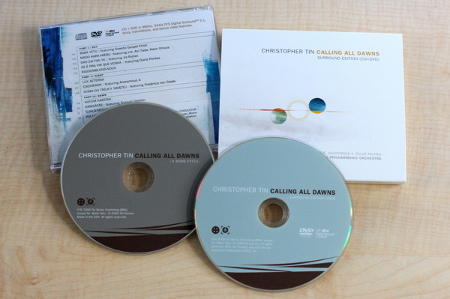
Chris: Last year, you revisited this project to produce Calling All Dawns: Surround Edition alongside engineer John Kurlander. What do you think the surround mixes bring to the album experience? Did you pay special attention to the album’s presentation?
Christopher Tin: It sounds absolutely amazing in surround! It’s something that John and I had wanted to do for awhile, and it was sort of a labor of love. John’s an amazing engineer. Bruce Maddocks as well, did an amazing job mastering both the stereo and surround versions of the album. They’re both permanent parts of my team now.
Chris: Many thanks for your time today, Christopher Tin. Is there anything else you’d like to say aboutGod of Love or your productions in general? In addition, is there a message you’d like to send to your fans around the world?
Christopher Tin: I appreciate all the support and encouragement! I made Calling All Dawns because fans wrote to me and asked me to do an album. In other words, I listen to what the fans say. If people want to hear more of a certain type of music that I do, they should let me know! Otherwise, I’m just going to keep doing projects that interest me, across a wide spectrum of genres.
Posted on February 1, 2012 by Chris Greening. Last modified on February 27, 2014.



